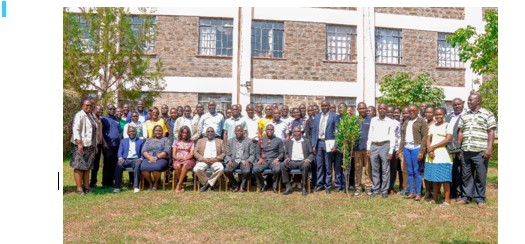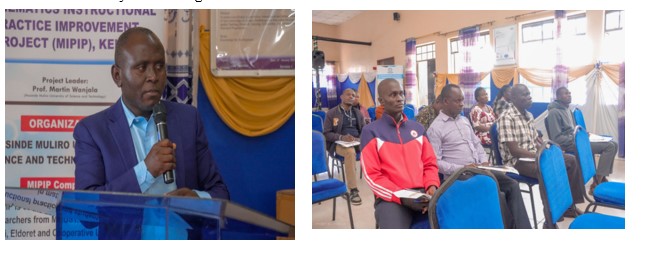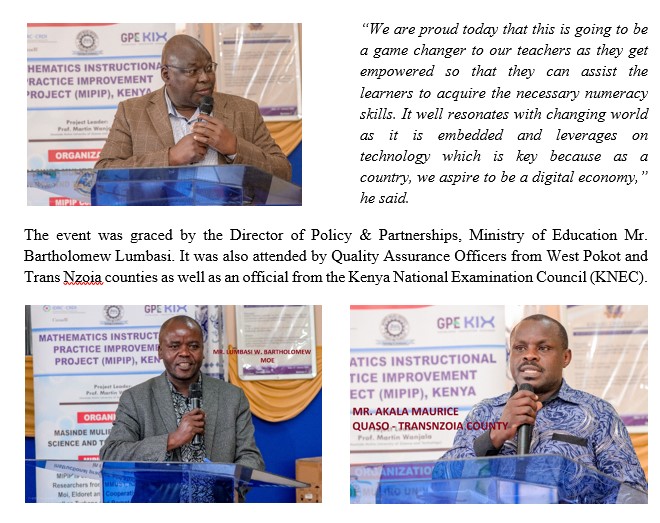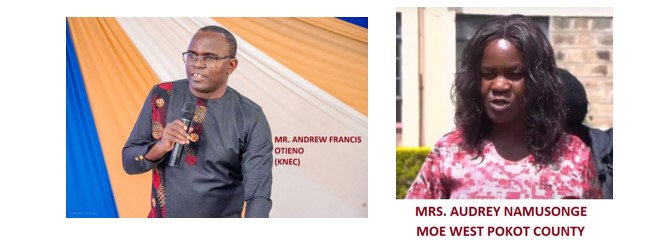
On Saturday 1st February, 2025 teachers of mathematics from selected schools in four counties namely; Bungoma, Busia, West Pokot and Trans Nzoia converged at Kibabii University for a Sensitization Workshop for Mathematics Instructional Practice Improvement (MIPI) Project. The MIPI Project is an ongoing Project spearheaded by the Principal Investigator Prof. Martin Wanjala, an Associate Professor of Curriculum, Instruction and Educational Media, Masinde Muliro University of Science and Technology (MMUST) together with Kibabii University team members; Prof. Julius K. Maiyo, Dr. Robert Kati, Dr. Duncan Wasike, Dr. Roselida Maroko and Dr. Joseph Bii from University of Kabianga.

According to Prof. Wanjala, the Project which is funded by the Global Partnership for Education (GPE), Knowledge and Innovation Exchange (KIX), a joint endeavour with the International Development Research Centre (IDRC) aims to improve the use of data to inform and improve instructional practice and student learning outcomes in mathematics.
The Workshop was officially opened by Kibabii Vice Chancellor Prof. Isaac Ipara Odeo. In his remarks, Prof. Odeo commended the Project and reiterated the importance it is going to have on Kenyan leaners.

The PI informed the participants that MIPIP is committed to strengthening the knowledge, skills, and attitudes of mathematics education stakeholders regarding the use of data to inform practice and improve student learning outcomes. Key stakeholders for the project included representatives from the Ministry of Education (MOE), Kenya Institute of Curriculum Development (KICD), Kenya National Examinations Council (KNEC), and CEMASTEA, who play an integral role in training, sensitization seminars, and monitoring activities. Furthermore, MIPIP emphasizes gender equality and inclusivity in its design and delivery of knowledge mobilization activities. By integrating these principles into material design and ensuring diverse voices are represented in knowledge-sharing platforms, He also said that MIPIP aims to create an equitable educational context.
Prof. Wanjala also took the participants through the key objectives of the MIPIP which included to: Improve the use of data to inform and improve instructional practice and student learning outcomes in mathematics in Kenya. The specific objectives of the Project are:
- To generate knowledge and evidence on data-driven pedagogical and inclusive practices that improve student learning outcomes and promote gender equality and inclusiveness in mathematics education;
- To strengthen mathematics education stakeholders’ knowledge, skill and attitudes in use of data and gender equality and inclusive practice to inform and improve practices and student learning outcomes in mathematics education; and
- To mobilize knowledge and evidence generated through engagement of key stakeholders by establishing Knowledge Network of Mathematics Educators (KNME) and leverage this for gender equality and inclusivity initiatives in mathematics instruction and uptake and scaling impact of the findings beyond study regions.
Dr. Jospeh Bii the Co-PI of the MIPIP project from Kericho county and also a senior Lecturer at the university of Kabianga excited the participants by sharing his enormous experience in teaching secondary school mathematics, he encouraged the teachers to be zealous and courageous to tackle the current challenges that threaten to affect the performance of subject in national examinations. Dr Bii also took through the participants on analysis of errors in the subject with emphasis on activities including:
- Identifying the Learner Errors
- Analyzing the errors
- Sharing within the PLC the errors
- Interrogating learners to elucidate the thinking behind the Errors
- Discussing how to handle the errors on mathematical tasks
- Sharing experiences in PLCs and During workshops
- Using the data to inform practice
- Concept mapping, designing of lessons, team teaching, lesson reflection
Dr Bii also explained how data was important in guiding key decision on general policies of the school and also in classroom approaches to be adopted that includes sharing experiences on effective instructional methods in PLCs and during workshops. He emphasized the need for teacher involvement in:
- Identifying and unpacking classroom data
- Understanding and analyzing patterns in the data
- Developing a plan for improvement based on the data analysis
- Teams work together to examine data from their own classroom
- Discuss patterns in students’ performance
- Engage in collaborative sense making
MIPIP seeks to foster cooperation and collaboration and initiate strategies that are student centered and promote student involvement in peer learning.

During plenary the participants asked several questions for clarification which focused on pedagogy, identification of errors made by learners, analysis and reporting of the project’s output and outcome. The PI and other team members clarified most of the issues raised and also participants were taken through the online platforms that they are expected to fill the logs so as track their progress and success. MIPIP has enhanced opportunities for teacher collaboration and networking as they seek to improve instructional practices in mathematics. Through the Knowledge Network of Mathematics Educators (KNME) created, the teachers have free access to MIPIP materials including training guides, digital content preparation and teacher learning monitoring tools and templates that enhance their knowledge and skills as they work in the professional learning communities.
In his concluding remarks, the Deputy Vice Chancellor (Prof. Julius Maiyo) emphasized the need for collaboration partnership and commitment from the stakeholders, project team members and the participants to ensure that project’s successful implementation. MIPIP seeks to enhance the use of data to inform and improve instructional practice and student learning outcomes in mathematics.
“This work was supported by the Global Partnership for Education Knowledge and Innovation Exchange, a joint endeavour with the International Development Research Centre, Canada.”


